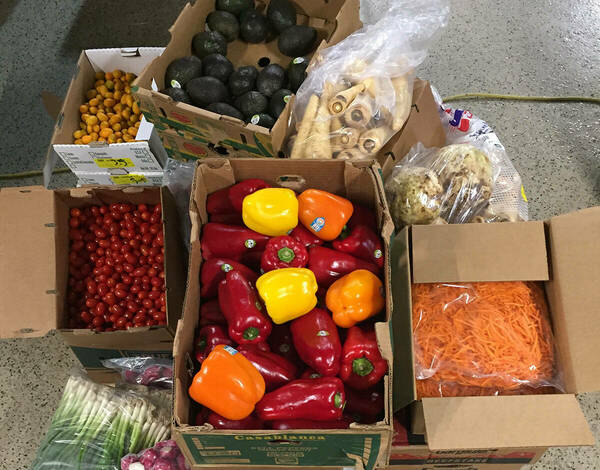
As Campus Dining restaurants prepared to close due to the suspension of in-person classes, chefs organized the food into what could be stored for later and what could be donated right away to local charities such as Cultivate Culinary.
Last Monday, March 23, Sean Wojtkowski, logistics manager for the Center for Culinary Excellence, gathered crates of ripe pineapples, cantaloupes and strawberries, along with fresh red and yellow peppers, lettuce, purple cabbage, carrots, tomatoes and eggs from Campus Dining retail outlets across campus and donated them to Cultivate Culinary. (See graphic for specific numbers.)
Meanwhile, the University’s athletics hospitality partner, Levy, recently donated about 1,000 pounds of fresh lettuce, peppers, zucchini, squash, broccoli, apples, fresh fruits, cheese, tortilla and kettle chips to Cultivate Culinary.
What Cultivate Culinary is not able to use for frozen meals, it passes along to pantries, the Food Bank of Northern Indiana and local non-profit agencies that distribute food on a daily basis to those in need in the South Bend area.
For every one pound of vegetables donated, Cultivate Culinary will create four servings of vegetables for a child in need in St. Joseph, Elkhart and Marshall counties. Although closed, the elementary, middle and high schools continue to distribute meals to 600 children through Cultivate’s Backpack program. In fact, during this time of need, many of the children are receiving additional meals during the week for their family members.|
Food rescue is not a new thing for Notre Dame. Throughout the year, University Catering donates unserved food left over from special events, such as the Martin Luther King, Jr. luncheon and Junior Parents’ Weekend, as well as what is available on home football game days after meals are served in the Shamrock Suites and in corporate tents. The Center for Culinary Excellence also supports Cultivate Culinary’s work by receiving large shipments of frozen food for the non-profit, storing the pallets of food and making them available to Cultivate Culinary as needed.
Food rescue efforts like these are part of the University’s comprehensive sustainability strategy, which also includes goals to reduce all types of waste; increase campus-wide, single-stream recycling; introduce composting at retail locations; and reduce water and energy consumption.
To learn more about Cultivate Culinary’s work or to get involved, visit cultivateculinary.com.
By the numbers
Since in-person classes were suspended for the semester…
Campus Dining has donated:
2,931 lbs. of dairy, including 170 gallons of milk
1,350 eggs
893.5 lbs. of vegetables
514 lbs. of meat
142 lbs. of fruit
10 lbs. of starch
Originally published by at ndworks.nd.edu on March 29, 2020.